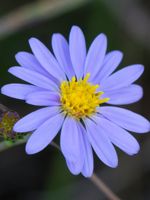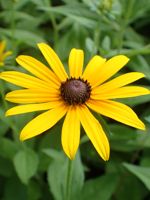Mon-Fri 9am - 5pm Mountain time
Smooth Aster vs Black-Eyed Susan
Symphyotrichum laeve
Rudbeckia hirta
NOT AVAILABLE THIS SEASON - MIGHT RETURN
NOT AVAILABLE THIS SEASON - MIGHT RETURN
Smooth Aster is a native perennial wildflower known for its violet-blue, daisy-like flowers. They bloom later in the season, from late summer to early fall. The flowers attract a variety of pollinators, including bees, butterflies, and other beneficial insects. It also serves as a host plant for the Silvery Checkerspot (Chlosyne nycteis) and Pearl Crescent (Phyciodes tharos) butterflies, further enhancing its ecological value. This easy-to-grow wildflower is well suited for native wildflower gardens, pollinator gardens, and naturalization projects.
The Smooth Aster’s non-aggressive root system allows it to spread slowly, and it is more likely to reproduce by seed, which can be controlled through deadheading.
Black-Eyed Susan is a striking native wildflower known for its bright yellow, daisy-like flowers with dark center disks. With deadheading, the plant can bloom for an extended period, from mid-summer to early fall. These cheerful flowers attract a variety of pollinators, including bees and butterflies. Adding to its ecological value, the plant also acts as a host for the Wavy-Lined Emerald Moth (Synchlora aerata) and the Silvery Checkerspot (Chlosyne nycteis) butterfly.
While it is typically a short-lived perennial or biennial, the plant freely self-seeds. This allows it to persist in the landscape, particularly in natural areas where it can spread and establish itself. This plant is drought-tolerant, salt-tolerant, and deer and rabbit-resistant, making it ideal for challenging environments. The Black-Eyed Susan is well suited to wildflower gardens, pollinator gardens, as well as slopes, banks, and naturalized areas.

